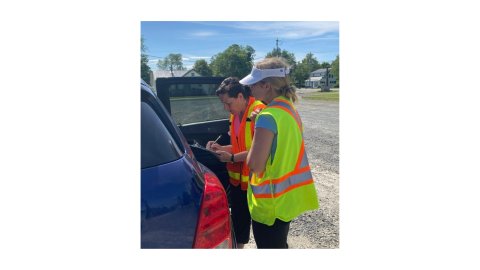Media Release - September 24, 2025
Nova Scotia drivers struggle to buckle kids safely, study finds
Halifax, NS— The results of a recent research study conducted in Nova Scotia found that 81% of car seats and booster seats were used or installed incorrectly, demonstrating an urgent need to increase access to education and resources for families. During the study, the study team assessed the real-world use of car seats, booster seats, and seat belts for 1005 child passengers in Nova Scotia.
“This study gives us the concrete evidence we need to take further action. It tells us where the gaps are, and what support is most needed,” explains Katherine Hutka of Child Safety Link, the injury prevention program of IWK Health. “Behind each data point is a child who is not as protected as they could be. These aren’t just numbers—they represent real families in our communities, families who think they’re doing the right thing, often without knowing safer options exist.”
The study was conducted by Dalhousie University in collaboration with Child Safety Link, with funding from Cybex Canada and support from the Child Passenger Safety Association of Canada (CPSAC) and community partners including regional police departments, fire stations and the RCMP. A total of 682 vehicles were assessed at 41 check events in 33 communities from May to November 2024.
According to Hutka, the 2024 data found that 81% of children using a car seat or booster seat had at least one error. When you look at just rear- and forward-facing car seats, 84% were found to have misuse, compared to a prior study, conducted in 2012, where 73% of car seats were misused. This upward trend in misuse, means that parents and caregivers need more support to keep their children safe on the roads.
The preliminary findings of the study are being released to coincide with national Child Passenger Safety Week (CPSW) in Atlantic Canada (September 21-27, 2025). This week is an opportunity for Child Safety Link and its Atlantic Canadian partners to highlight how to best protect children from injury in motor vehicle collisions.
Injury does not affect every family equally. Child Safety Link’s focus this year is “Breaking Down Barriers to Buckling” to highlight multilingual resources, equipment grants, education, and support for families with barriers to safely buckling their child in the right seat. As part of Child Passenger Safety Week 2025, Child Safety Link will be sharing the following top tips to keep children safe in the car:
- Don’t rush your child through each stage
- Make sure your child’s harness is snug
- Install your seat tight to the vehicle
- Always use the tether on a forward-facing car seat
- Always follow the instructions for your seat
- Seek additional help and support when you need it
Parents and caregivers with questions can call Child Safety Link’s car seat support line at 1-866-288-1388 (toll-free in Atlantic Canada) or 902-470-7036, or email childsafetylink@iwk.nshealth.ca.
They are also encouraged to visit www.childsafetylink.ca to find child passenger safety information for every age and stage, including downloadable fact sheets, checklists and instructional videos. Many of these resources have been translated into additional languages including French, Mi’kmaq, Wolastoqey, Arabic, Mandarin Chinese, Nepali, Ukrainian, Russian, Farsi, Dari, Somali, Swahili, and Tigrinya.
-30-
Media contact:
Katherine Hutka
Health Promotion Specialist - Child Safety Link
Phone: (902) 470-7324
Email: Katherine.hutka@iwk.nshealth.ca
Mallorie Cornelius
Health Promotion Specialist - Child Safety Link
Phone: (902) 943-8675
Email: Mallorie.Cornelius@iwk.nshealth.ca
